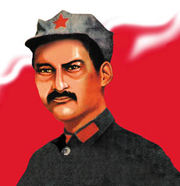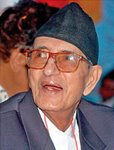Prime Minister Girija Prasad Koirala has said that the house of representatives would not be dissolved but the house session would be temporarily adjourned during the upcoming second round of peace talks with the Maoist rebels.
Talking to journalists at his hometown Biratnagar on Thursday, the premier also said that each party will enter the peace process with equal commitment once a special UN team arrives within two weeks.
Koirala, who said on Wednesday that the House would not be dissolved unless the issue of arms was settled, also informed that the current session of the House would be adjourned once the UN team arrived in the country. "The House will be adjourned for the time being to focus all attention on the peace process," he said.
PM Koirala further said, “The restored House would be temporarily adjourned during the decisive round of the much-awaited summit talks.”
The PM, however, did not give any timeframe about the upcoming high-level talks to be held between the top brass leaders of the seven-party alliance and the Maoists.
He added that the current “confusion” surfacing between the seven parties and the House will disappear once the nation enters the peace process. Stating that informal talks with Maoist leadership and other homework was going on, he said "decisive-summit-talks" with the rebels would be held shortly.
Koirala, who received widespread criticism for his statement of providing some space to the King in new democracy said that it is the people who will decide the fate of monarchy and people’s verdict will be acceptable to the Nepali Congress. Koirala however reiterated that the house has also accepted the ceremonial role in its historic declaration.
“It is the people who will decide monarchy’s fate. If the people want republic they will decide. It is not only me who is talking about ceremonial monarchy but the House passed the proposal unanimously,” he added
Talking to journalists at his hometown Biratnagar on Thursday, the premier also said that each party will enter the peace process with equal commitment once a special UN team arrives within two weeks.
Koirala, who said on Wednesday that the House would not be dissolved unless the issue of arms was settled, also informed that the current session of the House would be adjourned once the UN team arrived in the country. "The House will be adjourned for the time being to focus all attention on the peace process," he said.
PM Koirala further said, “The restored House would be temporarily adjourned during the decisive round of the much-awaited summit talks.”
The PM, however, did not give any timeframe about the upcoming high-level talks to be held between the top brass leaders of the seven-party alliance and the Maoists.
He added that the current “confusion” surfacing between the seven parties and the House will disappear once the nation enters the peace process. Stating that informal talks with Maoist leadership and other homework was going on, he said "decisive-summit-talks" with the rebels would be held shortly.
Koirala, who received widespread criticism for his statement of providing some space to the King in new democracy said that it is the people who will decide the fate of monarchy and people’s verdict will be acceptable to the Nepali Congress. Koirala however reiterated that the house has also accepted the ceremonial role in its historic declaration.
“It is the people who will decide monarchy’s fate. If the people want republic they will decide. It is not only me who is talking about ceremonial monarchy but the House passed the proposal unanimously,” he added


